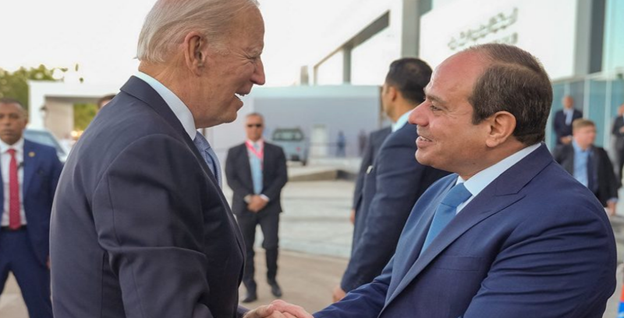
U.S. Senate has passed the FY 2024 appropriations act, which would increase human rights conditions on military aid to Egypt, amid its ongoing rights crisis
The U.S. Senate appropriators a week ago passed the Fiscal Year 2024 State, Foreign Operations, and Related Programs Appropriations Act, which would increase human rights conditions on military aid to Egypt in recognition of the country’s ongoing human rights crisis.
The Senate bill, approved in an overwhelmingly bipartisan fashion, sharply contrasts with the House version, which would provide $1.375 billion in military aid without any human rights conditions. The Senate bill would return to the typical $1.3 billion in military aid and includes robust human rights conditions on $325 million of it, the largest amount yet.
Of the $325 million ($5 million more than last year’s law), $225 million would have broad human rights conditions, including reforms that protect freedoms of expression, association, and peaceful assembly.
This portion would have a national security waiver, allowing the secretary of state to waive those conditions if they deem it to be in the national security interest of the United States.
The remaining $100 million—the largest ever amount for human rights conditions without a waiver—is conditioned on releasing political prisoners, providing due process, and ending transnational repression against Americans.
Importantly, following Secretary of State Antony Blinken’s contentious determination that the Egyptian government had made progress on releasing political prisoners last year, this year’s bill amends the language to read: “making clear and consistent progress in reducing the number of political prisoners” [emphasis added].
Then-Senator Patrick Leahy (D-VT) objected to the secretary’s determination last October, arguing that Egyptian authorities’ moves to release some political prisoners but arrest an even larger number did not constitute “clear and consistent” progress. This language change reaffirms that position.
In addition, the bill’s explanatory statement requires the State Department to consider the cases of political prisoners Hossam Khalaf, Salah Soltan, Anas El-Beltagy, and Alaa Abdel Fattah when making decisions on the human rights conditions.
Previous bills have included individuals—including Ola al-Qaradawi, Abdelrahman “Moka” Tarek, and most recently Mohamed El-Baqer—who have subsequently been released.
Lastly, the explanatory statement includes reporting requirements on end-use monitoring of U.S. military equipment in the Sinai as well as transnational repression of American citizens and their families in Egypt.
Human rights researcher Patrick George Zaki and human rights lawyer Mohamed El-Baqer were both released from prison on July 20, one day after they received presidential pardons.
Zaki had been sentenced to three years in prison on trumped up charges of “spreading false news” on July 18, while El-Baqer was convicted of the same charge in 2021 and was serving a four-year sentence.
On July 23, Zaki arrived in Italy, where he had been studying at the University of Bologna prior to his arrest.
He pledged to continue his human rights work and called for the release of Egypt’s tens of thousands of other political prisoners, such as Alaa Abdel Fattah, Ahmed Douma, and Mohamed “Oxygen” Ibrahim. “We hope that in the coming period there will be a presidential pardon for all prisoners of opinion,” he said.
However, El-Baqer’s and Zaki’s releases notwithstanding, Egypt’s human rights crisis remains as dire as ever.
With the national dialogue scheduled to resume public sessions on July 30 following a long break, the opposition Civil Democratic Movement (CDM) stated that its calls for the release of all of Egypt’s political prisoners as a condition for its participation are no closer to being fulfilled.
Human rights organizations have been circulating petitions calling on authorities to free political prisoners and specifically to release all women prisoners of conscience.
One of those women, young activist Aya Kamal al-Din, saw her detention renewed this week, revealing during the hearing that she has been kept in solitary confinement and denied her medication. Kamal al-Din was arrested more than one year ago, making this her third long-term detention since 2013.
Another woman political prisoner, human rights defender Hoda Abdel Moneim, has had her prison visits suspended again, just weeks after they were allowed for the first time. Abdel Moneim was sentenced to five years in prison in March alongside dozens of other members of the Egyptian Coordination for Rights and Freedoms.
The CDM noted that its demands for guarantees about free and fair presidential elections next year have also gone unmet.
Although Abdel Fattah al-Sisi has not yet announced whether he will run for a third term, pro-regime parties are nevertheless lining up to endorse him.
The Socialist Popular Alliance Party, in contrast, has started a campaign called “two terms is enough.”
Egypt will be better able to solve its economic and social crises “when there is a realistic and possible change in policies and a realistic and possible change in personalities and symbols,” explained the party’s head, Medhat al-Zahid.



